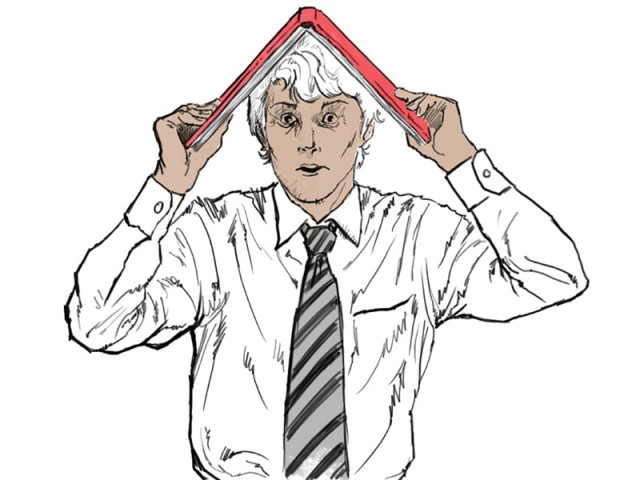Are there better ways to discipline students?
Suspension from school leads to long-term problems ranging from personality disorders to academic failures.

I thought I’d take it easy while on out of school suspension,
It’s got to be a lot more fun than going to detention.
I’ll play video games, watch some TV, bounce a ball from knee to knee,
Play with the dog throw a stick, practice my new magic trick,
But mum had other plans you see, a tutor she did get for me,
A lady who was tall and thin whose face would crack if she tried to grin.
Read this, write that, complete your math sheet then when you are finished get something to eat, But do not take too long, we’ve lots more work to do these worksheets must be finished before the day is through.
My hands began to cramp but she gave me no reprieve, finally it turned three o’clock and she got up to leave.
My day at home didn’t turn out how I had expected no video games, no TV, no magic trick perfected,
But lots of lessons were learnt that day, the one I most recall
is that out of school suspension wasn’t any fun at all Jacqueline Patricia
Life does not always seem fair, especially when you’re in your teens, and indeed it isn’t. There are so many temptations and the repercussions of being tempted are quite unpleasant, ranging from being grounded to being suspended from school. Being suspended is obviously more serious, in which case the school administration forbids the student from attending school for a certain period.
Frequent nightmares, depression, trauma and stress became the routine for Zeeshan, a 17-year-old boy who was suspended from school. He was taken to a psychiatrist by his parents to be treated as they were afraid that he might commit suicide. Zeeshan was suspended from school for an indefinite period of time, not for skipping class or smoking in the school but for mischievous behaviour.
It was the second-term of the academic year of O Levels in one of the major schools of the city and the CIE exams were approaching. Zeeshan did not commit a serious offence but the punishment handed out to him was rather harsh. The notice board in the principal’s office informed the faculty and other students that the boy was on indefinite suspension. The parents tried to approach the principal many times but failed to get in touch with her. Zeeshan was not permitted to attend any of the activities being held in school. He missed everything: the end of year party, class photographs, social events etc. The poor soul wept and kept quiet. He frequently asked his mother “Why am I not allowed to be a part of the school activities? I have been there since nursery and now when I am graduating, there will be no trace of me in the graduating photograph”, sobbed Zeeshan. The efforts of the parents went in vain. Zeeshan was never allowed to enter the school premises. This ordeal will be remembered by Zeeshan in the years to come and will probably have a huge negative impact on his personality.
Suspension is technically defined as disciplinary sanction imposed for prohibited conduct committed by a student. If a student is suspended, either an in-school or out-of-school suspension may be imposed. A suspension may be for three days, 10 days, or for a longer period of time.
According to reports, the longest suspension can last up to 20 days. These suspensions have become a major disciplinary action practised in private schools all over the country. Suspensions produce poor results with regular students and are educationally unsound for students. Yet schools continue with this dreadful disciplinary action and then justify it with: “We don’t have many other options” or “We have a large number of other students to deal with.”
The strict policies of schools allow principals to permanently expel students who are found 1) with a dangerous weapon 2) with drugs, or alcohol or 3) assaulting any school employee. Students can also be suspended or expelled if they are charged with or convicted of a felony.
The need for disciplinary practices to address serious student misconduct is undoubted. What research has questioned is why some students seem to be suspended more often than others, what effect suspension has on students, and whether or when alternatives to suspension might be more effective practices than suspension itself. Although the use of suspension is an accepted practice by both educators and researchers, its application is often problematic and controversial.
Research has consistently found that males are much more likely to be suspended than females. Research also says that students who are frequently suspended are also less likely to have parental supervision at home. Furthermore, students with emotional, behavioural, or learning disabilities are more likely to be suspended. Students with an Attention-Deficit/Hyperactivity Disorder (ADHD) or Emotional Behavioural Disorder are more likely to be suspended than are students with a Learning Disorder.
Generally, a suspension occurs as a result of inappropriate behaviour. During the suspension, a student loses out on being educated as well the opportunity to interact with others in school. If the suspension is given within the school then the student would be in any place but the class room. Out of school suspensions reward the child for inappropriate behaviour by giving them a day or so off from school. Moreover, if the child is allowed to maintain normal activities at home, i.e. watch TV, etc., it merely compounds the ineffectiveness of the suspension. Some suspended students report that suspensions are not helpful and that being suspended increases their likelihood of receiving future suspensions. They perceive suspension as “an officially sanctioned school holiday.” In addition, school suspension seems to accelerate a child’s path to juvenile delinquency. With a suspension, students do not get counselling for their misbehaviour or advice on how to change their conduct. Students also experience lower academic performance because of the numerous class lessons they miss. Research indicates that school suspension is not an effective way to improve student behaviour and often leads to declining behavioural and academic outcomes for students. Schools with high suspension rates may be engaging in a counterproductive practice.
Research also says that if a school decides to suspend a child for swearing at a teacher, arguing, fighting or other types of unacceptable behaviour, then it becomes easier to resort to the same punishment each time. Why? Because suspensions solve the school’s immediate problem, getting rid of a disruptive student. It becomes an easy fix. Unfortunately, it is a poor solution because it does nothing to change behaviour but often aggravates the problem. There are other options for changing behaviour such as providing additional time at school when the school day is over or on Saturdays and requiring the cleaning of the cafeteria as a consequence. Schools usually do not do this because it would mean that they would have to spend extra time supervising the students. The use of effective discipline frequently means that they may have to suffer a bit initially to achieve the desired long-term result.
According to research, students kept under frequent suspensions may choose to drop out of school. Such students could benefit from individual counselling. Schools may be able to reduce their dropout rates by placing less emphasis on suspension as a disciplinary consequence and using alternative consequences that do not involve removal from school. Schools must revisit the workings of their suspension system.
There are always pros and cons to each punishment. Each school needs to determine which one works and which one doesn’t. If we believe our schools truly are places of education, then expelling a student should be the last resort.
Published in The Express Tribune, August 13th, 2011.



















COMMENTS
Comments are moderated and generally will be posted if they are on-topic and not abusive.
For more information, please see our Comments FAQ